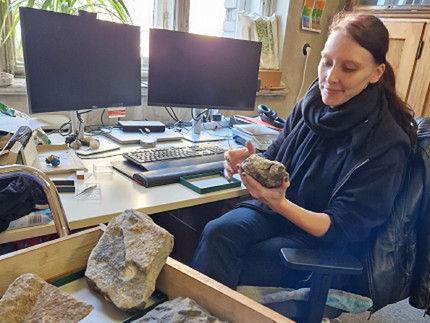Maraike Hofer, Museum für Naturkunde Berlin
Where do you work and what is your job?
I work in the mineralogical collections of the Berlin Natural History Museum. The job itself is called collection care. At the moment, a lot of things in our collection are still in need of digitalization. Many of the almost 300,000 objects in the collection have been at the museum for a very long time and need to be catalogued, identified and photographed.
What were your previous professional stations?
I finished my studies in Potsdam at the beginning of 2018. By then, I had already worked for over 3 years in the collection of the Institute of Geosciences as a student assistant. After that, I got a job at a small research company in Adlershof. When my contract there expired, I had to look around again and, of course, I always searched through the job advertisements of the well-known institutions in Berlin and Brandenburg. At first, I came across a job at the museum where you had to photograph insects, but it was only limited to six months. I applied there quite awkwardly and actually managed to get the job. My work as a collection student assistant in Potsdam definitely gave me an advantage.
How did you get your current job?
A position in “insects” was basically my stepping stone into mineralogy. During my short time in the museum, my current position was advertised and I applied for it straight away. My chances weren't too bad as I already had working experience in collections and already knew the museum.
What attracted you to the job?
I really enjoyed the student assistant position at the university and I always thought that I would like to work in a collection again - if it ever came up. I like the broad field of minerals and rocks that I work on. During your studies, you get to know tons of minerals, especially at the beginning, and only come into contact with very few of them later on. Here, I can deal with everything in greater depth. It was always clear to me that I didn't want to have a purely office-based job just doing computer work.
What are the most important skills you need for this work?
It definitely makes sense to have knowledge of minerals and rocks. It is also important to value the objects and treat them accordingly. Most of it has been here for over 100 years and some of it is very fragile. It's better not to be too rough around the edges handling the special samples.
What does a typical working week look like for you?
My focus is on the boxes of objects: The collection items have to be cleaned, labeled with inventory numbers and entered into a database. However, this work is often interrupted by public relations work such as guided tours or picking out samples for inquiries. Meetings also take place from time to time, but they don't take up a lot of time.
What do you like about your job and what challenges you the most?
As I mentioned before, I like the variety of objects that I work with, as this is also my original motivation for studying Geosciences. I never wanted to lose sight of that. I've already forgotten a lot of things and have to brush up on them. Part of my job is to read old labels. That can sometimes be difficult because they are handwritten and not always easy to read. But it's also possible to get used to and familiarize yourself with them. And of course, it's also pretty cool to walk past the dinosaurs every morning.
How much of the knowledge you acquired during your studies do you need in your job?
Everything from the field of mineralogy and rock identification. But a lot has been lost since I graduated. Fortunately, I haven't needed math so far. I need very little from the scientific field of my Bachelor's and Master's thesis. I think that's a bit of a shame because they were very exciting topics. For example, I wrote my Master's thesis on mantle rocks that were collected as xenoliths at a volcano in Colombia.
Looking back, how do you feel about your Geosciences studies at the University of Potsdam?
I really liked most of the courses. Most were exactly my area of interest. I'm also very glad that I didn't let courses like math or physics put me off and that I can now enjoy the beautiful aspects of Geosciences. Overall, I'm very glad that I chose this study program and I also feel that I got a good education in Potsdam.
Do you have any tips for our graduates for a successful career start?
Don't let anything stop you from pursuing your dream job. With a university degree, you are very qualified. It may be that you initially work in something less interesting that is not so much fun. Nevertheless, the situation can change at any time. If you send out a lot of applications, you'll get feedback somewhere along the line. And once you're in the world of work, there are always opportunities.
Link: showing a video explaining parts of Maraike Hofer`s work (in German):

